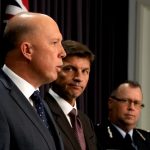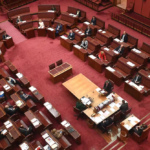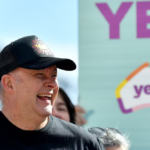How Czechs view the war in Ukraine

President Vladimir Putin dared to invade Ukraine because he was confident that a large majority of Russians would back his attack. And removing the Russian autocrat would probably not bring the war to a swift end.
These assessments were delivered in Canberra by Vaclav Malik, a long-time Czech intelligence officer who is now a senior analyst with the European Values Center for Security Policy, a Prague-based non-government think tank.
Malik believes that if Putin isn’t repelled in Ukraine, he will come after other nations including Poland, the Baltic states and the Czech Republic. ‘They are all vulnerable.’
He believes the problem is bigger than Putin. ‘It is not Putin’s war,’ Malik says in an interview with The Strategist. ‘It’s Russia’s war. Even if you get rid of Putin, the war will go on. And Putin is using the sentiment in Russian society. If there was no hunger for the war, or if they were not eager to conquer, especially Ukraine, he would not dare to do that. You can’t start such a war if you’re not one hundred per cent sure the population is behind you.’
Despite the casualties suffered by poorly equipped Russian forces, support for the war remains high among Russians—and not just among Putin’s messianic supporters, says Malik. Strong support is clear in social media traffic within Russia, Christmas greeting cards celebrating Putin’s ‘special military operation’, and other sources of information.
The Free Russia Foundation, consisting largely of political exiles, said in May that all Russians must accept responsibility for crimes against humanity committed by their authorities. ‘Even the Russian opposition accepts that “we are all guilty”,’ says Malik.
Russians originally backed Putin because they regarded this as a campaign to conquer Ukraine and get rid of ‘Nazis’, Malik says. Now they continue to support the war despite humiliating defeats because they believe it is them against the West. ‘It’s this fallen empire and nostalgia to be an empire again. That’s why there is a huge support.’
Putin is prepared to wage a long war of attrition, and because of battlefield failures he’s spreading the blame to his generals and other political leaders including Defence Minister Sergei Shoigu.
Another target for blame is General Sergey Surovikin, who was recently made commander of Putin’s ‘special military operation’ in Ukraine. ‘He’s creating a pool of people responsible for an unsuccessful war.’
Prime Minister Mikhail Mishustin has been charged with shifting Russia’s economy to a war footing and Moscow’s mayor, Sergey Sobyanin, oversees troop mobilisation.
Neither side releases casualty figures, but, according to various estimates, between 78,000 and 100,000 Russians have been killed so far. The US has estimated that 40,000 Ukrainian civilians have been killed.
Malik expects Putin to order another wave of mobilisation, no later than March. Russia has an estimated 145 million people, so conscripting another 300,000 is nothing, he says.
Despite Russia’s losses, Malik doesn’t see any likelihood of a military coup in the near term. And Shoigu, who controls the army, is Putin’s close friend. There was, of course, a precedent in 1917 when dissatisfied soldiers returned from the war against Germany and organised the socialist revolution. ‘So you cannot exclude it, but I believe the probability is low,’ Malik says.
Russia’s many security agencies compete, so there’s little likelihood of them uniting against Putin, he says. Even if they do unite, any new administration will struggle to establish legitimacy in the face of agencies protecting Putin.
Malik doesn’t doubt Ukraine will fight on through winter. Soldiers have been supplied with winter clothing, much of it from Canada. ‘When you check pictures of Russian and Ukrainian soldiers, you see the huge difference in how they’re equipped for winter.
‘In Russia, it’s impossible to get winter clothes for the soldiers. They’ve signed an agreement with North Korea to provide them with some kind of clothing, which is crazy. They’ve even asked Turkey to provide thousands of sets of winter clothing. The Russians are just not ready for it, but the Ukrainians definitely are with all the necessary equipment.’
Ukraine is determined not to negotiate, says Malik. ‘They want to fight while they feel they have momentum. The leaders in Kyiv are convinced that if they agree to talks, Putin will use the respite to prepare a new offensive.’
A pause for talks would just be time given to Putin to produce more tanks and continue his aggression, says Malik. ‘So, they are absolutely against any kind of negotiations unless Russia agrees to pull back to the borders of, not 2014, but 1991.’ That would include Russia returning Crimea to Ukraine.
Malik believes the war will continue until at least the middle of 2023.
Asked how Putin might escalate his attacks, Malik says Russia still has stockpiles of ground-attack missiles, as well as air-defence missiles that could be used against ground targets. He doesn’t believe Putin will use nuclear weapons at this stage.
And despite Ukraine’s determination to fight, Putin’s massive attacks on its energy infrastructure have placed the country on the brink of humanitarian catastrophe.
‘Every week it’s getting worse. There are no spare parts for the transformer stations. The electricity grid is disconnected from those in the EU. Russia is targeting even the entry points connecting Ukrainian power lines with European transmission operators to stop them exporting electricity to Ukraine. This will be a very difficult time.’
Malik says Surovikin use the same strategy when he commanded Russian forces in Syria. ‘They’ll take out the critical infrastructure, attack civilians and use the time they have to try to build up desperation in the Ukrainians.’
Ukraine is getting ready for that, says Malik. Some of the population is likely to go to neighbouring countries for the worst of the winter.
During the last mobilisation, Putin put at least 250,000 men into uniform and immediately threw around 70,000 of them into the fighting, mainly in Donetsk to try to stop the Ukrainian offensive.
‘Those people were slaughtered by the Ukrainians because they were not trained, not equipped, just with a Kalashnikov and two magazines.’
The rest are now being trained, some of them in Belarus, which still has non-commissioned officers and higher ranking officers available, Malik says. Russia’s more senior soldiers are on the front lines preparing for a spring offensive. ‘They will try to exhaust Ukraine by killing its manpower, and to exhaust the West through inflation and high energy prices.’
Energy shortages are already having a negative impact on many European countries. ‘Russia is using this, organising protests through proxies.’
Malik says that when almost 70,000 people protested in Prague, it was clearly a pro-Russian demonstration. ‘The organisers are the usual suspects, we know, who are connected to Russian influence groups. This is the state of the game now, this kind of escalation.’
So, will Ukraine and its European neighbours persevere?
They have no choice, says Malik. ‘It’s not about if they can; they must.’
If Ukraine’s President Volodymyr Zelensky opted to negotiate to stop the war, it would be difficult for him to survive politically, he says. ‘They must continue. The red lines are crossed. The West is also heavily invested in this process.
‘It’s difficult, but it’s necessary; otherwise, we are next.’
Putin, he says, will only give up the war when he’s sure he can survive any deal. ‘He started it to get rid of Ukraine as a positive example of Westernisation of a former Soviet Union country. It was a good example of a positive impact on former Soviet states, and he hated it. He’s been afraid that people at home will ask him, “How come Ukraine has nothing, but their standard of living is three times higher than ours, and we have all the natural resources?”
‘This was a pre-emptive attack and that’s why he insists also on destroying the critical infrastructure, to annihilate Ukraine so the Russians are happy and see that they have a better life than those in Ukraine. It’s about his political survival, political and economical of course.’
Malik says Ukraine and its allies appreciate Australia’s help.
But there’s also much at stake in the Indo-Pacific. ‘China is watching closely and is surprised that the West stayed united and is protecting and helping Ukrainians. In terms of any Chinese adventure against Taiwan, it’s a good deterrent. If we now back down, it’ll send a bad message to Beijing.’
This article was published by The Strategist.
Brendan Nicholson is the Defence Editor at The Strategist. He joined the Federal Parliamentary Press Gallery in November 1995 and has covered federal politics, foreign affairs, defence and national security issues for two decades, with The Canberra Times, The Age and The Australian.














